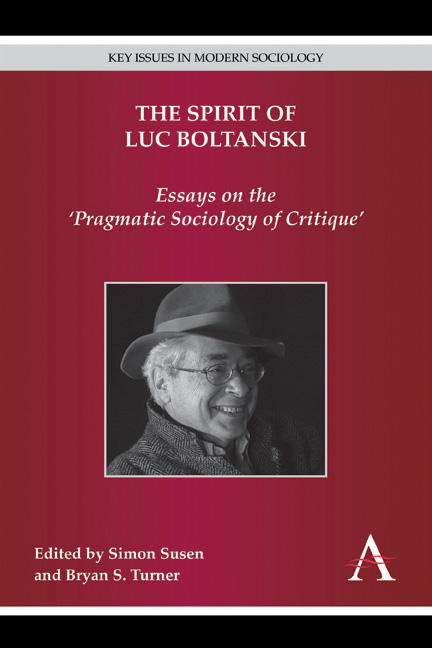Book contents
- Frontmatter
- CONTENTS
- List of Contributors
- Preface
- Part I Introductory Remarks
- Part II Luc Boltanski and (Post-) Classical Sociology
- Part III Luc Boltanski and Pragmatism
- Part IV Luc Boltanski and Critique
- Part V Luc Boltanski and Critical Sociology
- Part VI Luc Boltanski and Political Sociology
- Part VII Luc Boltanski and Contemporary Issues
- 18 Arranging the Irreversible: The Female Condition and Contradiction
- 19 Luc Boltanski and the Gift: Beyond Love, beyond Suspicion…?
- 20 The World of Worth in the Transhuman Condition: Prolegomena to a Proactionary Sociology
- 21 Luc Boltanski and the Problem of Time: Notes towards a Pragmatic Sociology of the Future
- Part VIII Luc Boltanski in Conversation
- Part IX Luc Boltanski and His Critics
- Index of Names
- Index of Subjects
21 - Luc Boltanski and the Problem of Time: Notes towards a Pragmatic Sociology of the Future
from Part VII - Luc Boltanski and Contemporary Issues
Published online by Cambridge University Press: 05 December 2014
- Frontmatter
- CONTENTS
- List of Contributors
- Preface
- Part I Introductory Remarks
- Part II Luc Boltanski and (Post-) Classical Sociology
- Part III Luc Boltanski and Pragmatism
- Part IV Luc Boltanski and Critique
- Part V Luc Boltanski and Critical Sociology
- Part VI Luc Boltanski and Political Sociology
- Part VII Luc Boltanski and Contemporary Issues
- 18 Arranging the Irreversible: The Female Condition and Contradiction
- 19 Luc Boltanski and the Gift: Beyond Love, beyond Suspicion…?
- 20 The World of Worth in the Transhuman Condition: Prolegomena to a Proactionary Sociology
- 21 Luc Boltanski and the Problem of Time: Notes towards a Pragmatic Sociology of the Future
- Part VIII Luc Boltanski in Conversation
- Part IX Luc Boltanski and His Critics
- Index of Names
- Index of Subjects
Summary
Introduction
This chapter is concerned with issues of temporality and the programme of pragmatic sociology. It outlines a problem of time operating within this programme. This problem is identified as concerning the location of social change and the new as external to situations and events, a positioning which, I will argue, eschews the indeterminacy and openness of the contemporary world. I suggest further that such a positioning of the new also cannot come to grips with forms of critique that have no time, or, better said, forms of critique that have run out of time or are dispossessed of time and, in addition, make demands for time itself. In identifying the latter form of critique, I contend that the logic of change elaborated in The New Spirit of Capitalism (2005 [1999]) – namely, the incorporation of the dynamic of external critique into capitalism – has reached its limit, a limit which in turn demands that sociologists address questions of change and time anew. To this end, in this chapter I outline some of the axes along which a pragmatic sociology of change, innovation, and the new may be elaborated. Yet, to grasp fully how and why the issues of change and the new require attention, I will also propose that it is crucial to register that the significance of the programme of pragmatic sociology lies not only in a post-Bourdieusian renewal of social science, as is often assumed, but also in its relevance for and in an increasingly pragmatic world. To begin to unfold these lines of intervention, I turn first to the issue of the development of pragmatic sociology and the renewal of the social sciences.
The Renewal of the Social Sciences
The programme of pragmatic sociology or the sociology of critical capacity, of which Luc Boltanski is a key proponent, has been understood as an attempt at a renewal of the social sciences (Blokker, 2011).
- Type
- Chapter
- Information
- The Spirit of Luc BoltanskiEssays on the 'Pragmatic Sociology of Critique', pp. 517 - 538Publisher: Anthem PressPrint publication year: 2014

